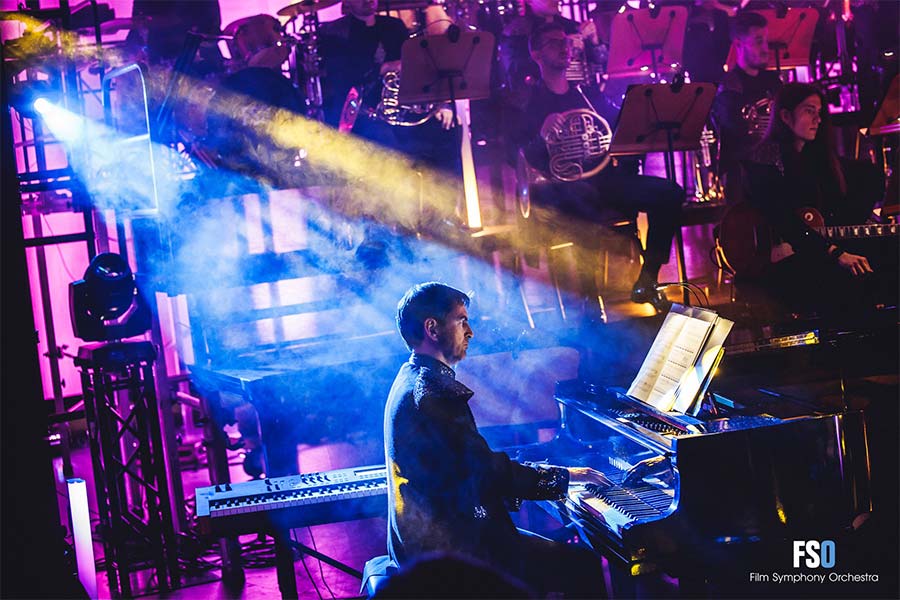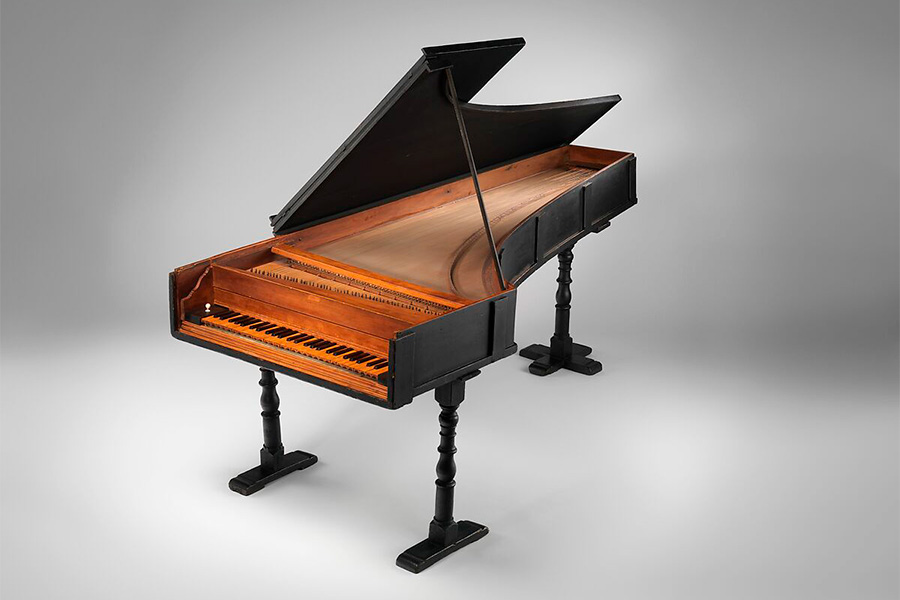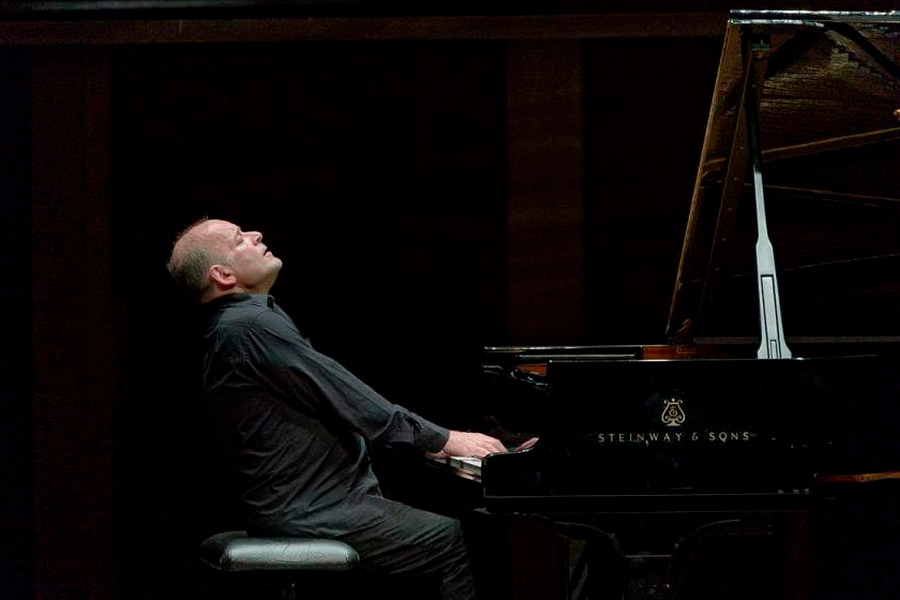Origen del piano y los pianistas más famosos de la historia
Este nuevo post del blog de Film Symphony Orchestra está dedicado a uno de los instrumentos más importantes y hermosos que ha creado el ser humano para hacer música, el piano. Vamos a realizar un repaso sobre la historia y origen de este instrumento, repasando así a los compositores más reconocidos.
Es un instrumento musical armónico, clasificado como instrumento de cuerda percutida por el sistema de clasificación tradicional, y según la clasificación de Hornbostel-Sachs es un cardófono simple. Su caja de resonancia lleva agregada un teclado con el que se percuten las cuerdas de acero con martillos forrados de fieltro, produciendo el sonido. A partir de ahí, las vibraciones se transmiten a través de los puentes a la tabla armónica, que las amplifica. Está formado por un arpa cromática de cuerdas múltiples, accionada por un mecanismo de percusión indirecta, a la que se han añadido apagadores. Ahora que celebramos el Día mundial del piano: conoce a los mejores pianistas.
¿Cuándo es el Día Mundial del Piano?

¿Por qué se celebra el día 29 de marzo el Día Mundial del Piano?
Esta fecha esconde una interesante historia. Fue a partir del siglo XIX, cuando la mayoría de los pianos comenzaron a fabricarse con 88 teclas en total –una cifra que se mantiene a día de hoy, en los pianos modernos- y que ha tomado un significado simbólico.
Para entender por qué el 29 de marzo, de los años bisiestos, se celebra el Día Mundial del Piano, sólo tenemos que contar día a día, para darnos cuenta de que esta fecha es el día número 88 del calendario, precisamente, el número de teclas del instrumento. Esta iniciativa fue impulsada por el músico y compositor alemán Nils Frahm y se celebra desde el año 2015.
Bartolomeo Cristofori y la historia del Piano
¿Qué simboliza el piano?
La palabra piano deriva de la palabra original en italiano del instrumento, ‘pianoforte’ (piano: «suave» y forte: «fuerte»), asignado a su primer constructor, Bartolomeo Cristofori: clavicémbalo col piano e forte. Literalmente, «clavecín con sonido suave y fuerte».
El primer piano de la historia
El piano que vemos en la fotografía es el más antiguo del mundo. Data de 1720, y a día de hoy aún se puede tocar. Es uno de los tres instrumentos procedentes del taller de Bartolomeo Cristofori, quien inventó el piano hacia el año 1700 en la corte florentina de los Médici. Este complejo mecanismo prefigura el piano moderno, pero el teclado era más corto y carece de pedales para generar contrastes modales.
Sin embargo, la extensión comprende tres registros distintos: tonos bajos, cálidos y sonoros; medias octavas, más dinámicas; y tonos agudos, de sonido breve y brillante. Destinado básicamente al acompañamiento, el invento de Cristofori se denominaba, como hemos señalado, gravicembalo col piano e forte en referencia a su innovadora flexibilidad dinámica.

Importancia del piano en la música
El piano es uno de los instrumentos con mayor capacidad polifónica, por ello es el instrumento ideal para realizar una función complementaria y se hace imprescindible para la docencia musical del maestro. Por ello, es utilizado en la mayoría de las clases de solfeo de las escuelas de música y los conservatorios como el instrumento principal del pedagogo.
Muchas obras, célebres en su versión para orquesta, han sido escritas inicialmente para piano. Algunos ejemplos podrían ser las Danzas húngaras de Johannes Brahms, Cuadros de una exposición de Modest Músorgsi, Gimnopedias de Erik Satie o Canción de primavera de Felix Mendelssohn-Bartholdy.
¿Por qué es bueno tocar el piano?
La mayoría de la gente toca el piano porque les divierte. Pero hay razones por las que tocarlo estimula nuestro cerebro. En primer lugar ejercitas la coordinación independiente, ya que realizar de forma simultánea movimientos independientes con las manos, estimula diversas áreas del cerebro, al igual que ser capaz de leer partituras mejora extraordinariamente la coordinación entre la vista y las manos. De la misma forma, aumenta tu capacidad auditiva. Estas habilidades auditivas, potenciadas por el hecho de escuchar música, como debería sonar para tocarla, benefician la memoria verbal y permiten reconocer mejor las voces en un ambiente ruidoso.
Por otro lado, tocar el piano mejora tu capacidad lectora, dado que las notas de una partitura son como las letras en un libro. Ambas necesitan ser “descifradas” y combinadas para que el texto o la canción tengan sentido. Pero además, mejora nuestras habilidades con el lenguaje porque aprender un idioma extranjero está estrechamente relacionado con las habilidades de lectura y comprensión que acabamos de mencionar. Hay otros muchos beneficios, pero uno de ellos es también, que tocar el piano mejora nuestra destreza con las matemáticas. No debemos olvidar que las notas y ritmos, así como la teoría musical, están basadas en ellas.
¿Cuál es la canción más difícil en piano?
Es complicado, sino imposible, crear un ranking de las obras con más dificultades técnicas para interpretar al piano, pero Opus Clavicembalisticum, del compositor y pianista inglés Sorabji, suele ser elegida en los rankings con el número uno, por esta obra de cuatro horas de duración que exige una portentosa técnica. Otras obras que suelen aparecer en los rankings son Islamey, de Balakirev, Iberia, de Albéniz; Chacona, de Bach-Busoni o Gaspard de la nuit, de Ravel, como cima del piano francés impresionista.
Pianistas más importantes de la historia de la música

Frédéric Chopin: conoce sus mejores composiciones
El compositor polaco Frédéric Chopin, fue uno de los grandes maestros de la música romántica y escribió principalmente para piano solo. Fue el principal impulsor de la balada instrumental y ningún otro compositor ha aportado tantas obras significativas al repertorio pianístico. Entre sus mejores composiciones encontramos Nocturnos, Op. 9, entre los que se encuentra su Opus nueve, de los tres más conocidos. También podemos considerar Estudio Op. 10 y No. 12 in Do menor, el estudio revolucionario, Preludio, Op 28, No. 15, La Gota de Lluvia o el Concierto para piano No.2 en Fa menor, Op. 21.
El compositor Ludwig Van Beethoven y su gran aportación a la música
El músico de origen alemán Ludwig Van Beethoven (1770-1827) es uno de los compositores y músicos más reconocidos en el mundo y uno de los más importantes de la historia. Su gran aportación a la música es la ruptura con el clasicismo. Sus obras eran más libres y enérgicas, algo que influyó en los compositores del romanticismo, que buscaban expresar sentimientos más subjetivos. Una de sus contribuciones más importantes fue el desarrollo de grandes composiciones a partir de una estructura musical breve, conocida como motivo melódico, que desarrollaba a lo largo de la pieza. Entre sus obras más destacadas figuran la Sinfonía N. 3 en mi bemol mayor, Op. 55, Für Elise, o la Sinfonía N.5 en do menor, Op. 67, también denominada La llamada del destino.
Wolfgang Amadeus Mozart: el niño prodigio de la música clásica
Otro de los grandes e irrepetibles pianistas que no puede faltar en esta lista es Wolfgang Amadeus Mozart. Fue uno de los compositores clásicos más influyentes en la historia de la música occidental. Nacido en Austria el 27 de enero de 1756 en el seno de una familia acomodada, fue alumno de su padre, Leopold Mozart, famoso violinista de la época que trabajaba como instrumentista y compositor en la corte del arzobispo de Salzburgo. Cuenta la leyenda que con apenas cuatro años, Mozart sustituyó a un violinista de la orquesta de su padre y, se dice, que interpretó la pieza de principio a fin sin el más mínimo error. Entre sus grandes composiciones destacan Ave Verum Corpus, Kv. 618, Misa de Réquiem en Re menor, Kv. 626 y el Concierto para Clarinete en La mayor, Kv. 622, todas compuestas en 1791.
Johann Sebastian Bach y sus obras más reconocidas
Por su parte, Johann Sebastian Bach, otra de las leyendas de la música clásica, empieza a trabajar con 18 años como organista en Arnstadt y Mühlhausen. Entre los años 1708 y 1717 trabajó para el duque Wilhelm Ernst de Weimar, primero como organista, y después de 1714 como concertino. En 1723 es nombrado cantor en la Iglesia de Santo Tomás, y Director de Músca en Leipzig. Sus tres obras más relevantes son Pasión según San Mateo BWV 244, los Conciertos de Brandemburgo BWV 1046-1051 y las Suites Orquestales BWV 1066-1069, que siguen los esquemas clásicos de la forma suite del barroco musical.
Fanny Cäcilie Mendelssohn: pianista y compositora del Romanticismo
Fanny Cäcilie Mendelssohn, nacida en Hamburgo en 1805, es nuestra mujer en la lista, gracias a su aportación como compositora y pianista al Romanticismo temprano. Sus composiciones incluyen un trío para piano, un cuarteto para piano, una obertura orquestal, cuatro cantatas, más de 125 piezas para piano y más de 250 lieder, la mayoría publicadas de manera póstuma. Fue muy elogiada por su destreza para tocar el piano, aunque rara vez ofreció conciertos en público.
En su obra, encontramos cuatro composiciones imprescindibles para la historia de la música: Gartenlieder, Op. 3; Cantata Hiob; Nocturno en sol menor y el Cuarteto para cuerdas en Mi sostenido mayor, Allegro molto vivace. La primera de ellas incluye seis canciones para soprano, alto, tenor y bajo, publicadas en 1847 y basadas en una serie de textos de distintos poetas alemanes.
Louis Lortie: uno de los actuales pianistas más populares
Dejando atrás la historia y viajando a la actualidad, encontramos en Louis Lortie a uno de los pianistas más buscados hoy en día. De orígenes francocanadienses aunque radicado en Berlín, es un pianista internacional que ha grabado más de 30 veces para Chandos Records. También es conocido por ser uno de los mejores intérpretes de las piezas de Beethoven, Chopin y Ravel.
Lortie debutó a los 13 años con la Orquesta Sinfónica de Montreal y un par de años después, tocó con la Sinfónica de Toronto y estuvo de tour por Japón y China. En 1984 obtuvo el primer lugar de un concurso de piano y quedó en el cuarto puesto en el Leeds. Además de su gran desempeño, Lortie fue nombrado, igualmente, caballero de la Orden Nacional de Quebec y recibió un doctorado honorífico por su contribución al acervo cultural canadiense. En 2017 y 2018 ha sido artista invitado de la Orquesta Sinfónica de Shangai.

Javier Perianes: el pianista español más reconocido
Por último, si nos quedamos en nuestro país encontramos a Javier Perianes, nacido en huelva en 1978, y considerado uno de los referentes en el panorama musical actual español e internacional. Su nombre es habitual en la programación de prestigiosas salas de conciertos de todo el mundo, como el Carnegie de Nueva York o el Teatro de los Campos Elíseos de París. Colabora con importantes orquestas y directores nacionales e internacionales y en 2012, su disco grabado en directo con la Orquesta Sinfónica de la BBC y el director Josep Pons, en el que interpreta música de Falla, ha sido aplaudido por la crítica internacional y nominado a los Grammy Latinos. Ese mismo año, recibió el Premio Nacional de Música. También ha obtenido otros premios como el Tercer Premio del Concurso Europeo de Piano Greta Erikson o el Primer premio del Concurso Internacional de Piano ‘Premio Jaén’.

Importancia del piano en la orquesta sinfónica
El piano es uno de los instrumentos más importantes en la orquesta sinfónica, y se utiliza en muchos géneros y estilos de música. Su función en la orquesta es muy variada y depende en gran medida del repertorio que se esté interpretando. En la música clásica, el piano se utiliza a menudo como solista en conciertos para piano y orquesta, en los que el piano es el instrumento principal que interactúa con el resto de músicos. Estas obras son algunas de las más populares y famosas del repertorio de música clásica, y son una muestra del virtuosismo y la técnica requeridos para tocar el piano.
Por otro lado, el piano es también un instrumento muy utilizado en la música de cámara, donde se combina con otros como el violín, la viola, el violonchelo, el clarinete o la flauta, entre otros. En ese contexto, como en sus raíces, el piano es un instrumento de acompañamiento y se usa, a menudo, para proporcionar armonía y ritmo.
En la orquesta sinfónica, el piano a menudo tiene un papel de acompañamiento en la sección de cuerdas o en la de percusión. Además, también se utiliza en muchas ocasiones, para agregar efectos sonoros, como campanas o cuerdas, a la orquesta. En resumen, destaca por su versatilidad y es esencial junto a la orquesta sinfónica, por su capacidad para adaptarse a diferentes estilos y géneros, convirtiéndose también en un instrumento indispensable en la música clásica y en otros estilos musicales.



Excelente información
Hola Tania!
Muchas gracias por dejar tu comentario 🙂
Saludos